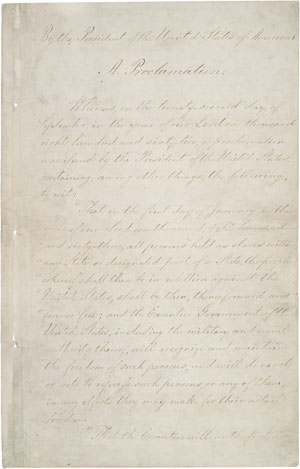
On the first day of January, 1863, in the midst of the Civil War, President Abraham
Lincoln made history by issuing an important proclamation to states and counties rebelling
against the Union. He wrote:
“. . . I do order and declare that all persons held as slaves within said designated
states, and parts of states, are, and henceforward shall be free; and that the executive
government of the United States, including the military and naval authorities thereof,
will recognize and maintain the freedom of said persons.”
The Emancipation Proclamation, as the issuance is called, did not end slavery, but
it did change the nature of the Civil War, allowing freedom to be gained with every
advance of Union troops. It also allowed black men to join the Union Army and Navy.
By the time the war ended in 1865, nearly 200,000 black soldiers had fought for the
Union and for their freedom.
This January marks the 150th anniversary of the Emancipation Proclamation, and to
celebrate, the document will be on display in the east rotunda at the National Archives
from December 30, 2012 to January 1, 2013. The document itself comprises five pages
written in long-hand cursive script and was originally bound with blue and red ribbons
tucked under a seal of the United States. Later it was placed in a volume with other
proclamations that was transferred from the State Department to the National Archives
in 1936. Today, the original document is only displayed for a short time each year
because of its sensitivity to light and the need to preserve it for future generations.
Events accompanying the viewing include a reading of the proclamation by historian
and musician Dr. Berenice Johnson Reagon on January 1 and a performance by the Washington
Revels. Also on January 1, from 11 AM to 2 PM storyteller Bill Grimmest will play Frederick
Douglass in a performance of “Tales of My Friend Mr. Lincoln.” One might also encounter
historical re-enactors portraying Harriet Tubman, Abraham Lincoln, and Rosa Parks.
The Emancipation Proclamation will be on display December 30 from 10 AM to 5 PM, December
31 from 10 AM to 1 AM, and January 1 from 10 AM to 5 PM. Throughout the three-day
viewing, several films about the history of the Civil War and slavery will be screened
at the Archives. Screenings, events, and viewing the document itself are free.
For more information about the document and the celebration of its 150th anniversary,
visit the National Archives’ website.
















